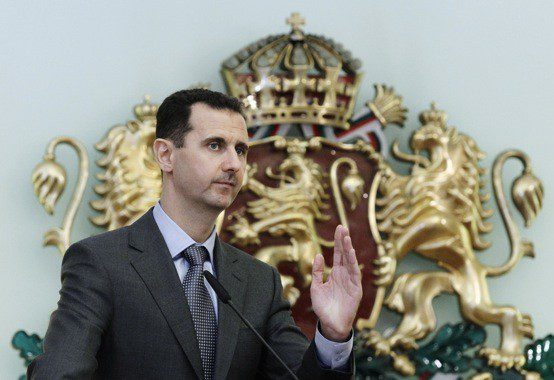Why Russia Supports Assad

Last weekend, National Security Advisor H.R. McMaster chided Russia for its “sponsorship” of Bashar al-Assad’s “murderous regime,” which he said ordered the recent chemical-weapons strike in Syria. “This is a great opportunity for the Russian leadership to reevaluate what they’re doing,” McMaster offered.
If the United States’ intent is to influence Russia to support more Washington-friendly policies, our policymakers must recognize and understand Moscow’s core interests—as Russians see them. Lecturing Moscow as a parent scolds a disobedient child is not likely to succeed.
Russia is not supporting the Syrian regime with considerable military power because they like Assad or his despicable policies.
Their objective is to enhance their ability to exert influence in the region, stabilize areas near their own borders that contain large Muslim populations, and ensure continued access to their Mediterranean port at Tartus.
Appealing to the moral high ground has no chance of influencing Putin.
According to the administration, the priority among American security objectives in the Middle East is the defeat of the Islamic State (ISIS), which still has major holdings in the Iraqi and Syrian cities of Mosul and Raqqa. Washington doesn’t do itself any favors by mocking and deriding the world’s second-most-powerful military power, which, if engaged properly, has the ability to help with this primary security goal.
The U.S. response to the barbaric chemical strike has been, to date, marked by errors in judgment and evidence of inexperience operating in the international arena. In the 24 hours following the strike, President Trump was already claiming the Syrian regime was directly responsible and began laying the groundwork for an attack. In an emergency UN Security Council meeting, U.S. Ambassador Nikki Haley blasted her UN colleagues, claiming that if the world body was unable to take action, “There are times in the life of states that we are compelled to take our own action.”
Meanwhile, Deputy UN Ambassador for Russia Petr Illichev cautioned patience, calling for a delay in any talk of a retaliatory strike until an investigation had identified the guilty party. According to Al Jazeera, a draft UN resolution called for “Syria to provide flight plans, flight logs, and other information on its military operations on the day of the assault … [as well as] the names of all commanders of helicopter squadrons to UN investigators and allow them to meet with generals and other high-ranking officials.”
Yet the Trump administration would not wait long enough to allow the UN time to weigh in on the matter, and likewise chose not to seek congressional authorization. Within 48 hours of the chemical attack, U.S. warships launched a cruise-missile strike against a Syrian airfield. In so doing, the U.S. virtually gave the Russians the upper hand.
Following the U.S.-led attacks, Russian President Vladimir Putin was quick to accuse the U.S. of a “violation of international law under a far-fetched pretext.” On Tuesday, Putin said he still supports a UN-sponsored investigation into the allegations that the Assad regime ordered the attack. The Russian deputy ambassador and president both scored public-relations points by making statements that sound rational and proper. They did not defend Assad or deny he had ordered the attack, but rather urged the U.S. not to act too quickly and supported a full investigation to determine who was to blame.
Wednesday in Moscow, Secretary of State Rex Tillerson met directly with Putin and reportedly advised the Russian president that he should recalculate the costs of remaining an ally of Syria. Russian Foreign Ministry spokeswoman Maria Zakharova was dismissive of Tillerson’s advice: “I believe everyone realized a long time ago that there is no use in giving us ultimatums. This is simply counterproductive,” she said.
The secretary of state and national-security advisor are both missing a key point: Russia is acting in ways consistent with how it sees its national-security interests in the region. Until senior U.S. leaders recognize this fact and order our own behavior accordingly, we can count on a continual worsening of relations with Russia and other competing powers.
In 1971 the USSR signed an agreement with then-dictator Hafaz al-Assad for access to the Syrian naval base at Tartus, which is still in effect today. It is Russia’s only naval access to the Mediterranean, and they are not going to give it up. There is no rational basis upon which to expect Russia to renounce its support for Syria.
This is not to say that Assad should not be held accountable, but if the U.S. wants to check Assad’s behavior and convince Moscow to help, the U.S. must stop misunderstanding or ignoring the motivations that drive Russian policy in Syria.
Russia has an interest in seeing the civil war come to an end as much as we do. The Kremlin would like nothing better than to see the conflict resolved so their costly military support can be substantially reduced or eliminated. Their own threat from Islamic terrorism would be reduced if the civil war ended. It can be assumed, however, that Putin will not support any outcome that results in a Syrian government that is not friendly with Moscow.
The bottom line is that the United States must genuinely get out of the regime-change business— which never ends well—and focus instead on policies that have a realistic chance of attaining U.S. strategic objectives.
Daniel L. Davis is a Senior Fellow for Defense Priorities and a former Lt. Col. in the U.S. Army who retired in 2015 after 21 years, including four combat deployments.
Comments